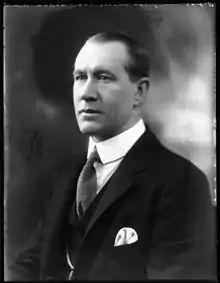Alfred Bonwick
Alfred James Bonwick (1 November 1883 – 4 September 1949) was a Liberal Party politician in the United Kingdom.

Background
He was born in London, the only son of James Bonwick and Elizabeth Fowler. In 1909 he married Florence Elizabeth Robinson. They had one daughter.[1]
Professional career
He was a director of a bottle making company.[2] He was Secretary of The Nation magazine. He was a business manager for a variety of newspapers owned by the Joseph Rowntree Social Service Trust.[3]
Political career
He was Liberal candidate for the Unionist seat of the Chippenham division of Wiltshire at the 1922 General Election. He was a supporter of H. H. Asquith and an opponent of the Coalition Government of David Lloyd George. He was elected as Member of Parliament (MP) at the first attempt, defeating the Conservative MP George Terrell. This was the first time a Liberal had won Chippenham since the landslide election of 1906;
| Party | Candidate | Votes | % | ±% | |
|---|---|---|---|---|---|
| Liberal | Alfred James Bonwick | 10,494 | 48.6 | +19.4 | |
| Unionist | George John Edmond De Beauvoir Terrell | 10,006 | 46.3 | -6.8 | |
| Labour | William Robert Roberts | 1,098 | 5.1 | -12.6 | |
| Majority | 488 | 2.3 | 26.2 | ||
| Turnout | 78.0 | +16.7 | |||
| Liberal gain from Unionist | Swing | +13.1 | |||
In 1923 he was appointed a Member of the Committee of Enquiry into Government Printing Establishments, on which he sat for 4 years.[1] Against a national background that was witnessing a Liberal revival, Bonwick was re-elected in 1923 with an increased majority;
| Party | Candidate | Votes | % | ±% | |
|---|---|---|---|---|---|
| Liberal | Alfred James Bonwick | 11,953 | 51.7 | +3.1 | |
| Unionist | Victor Alexander Cazalet | 11,156 | 48.3 | +2.0 | |
| Majority | 797 | 3.4 | +1.1 | ||
| Turnout | 81.6 | ||||
| Liberal hold | Swing | +0.6 | |||
In May 1924 he was appointed as a Liberal Party Whip.[5] At the 1924 general election he lost the seat to the Conservative Victor Cazalet, a loss that was in line with results elsewhere in the country;
| Party | Candidate | Votes | % | ±% | |
|---|---|---|---|---|---|
| Unionist | Victor Alexander Cazalet | 13,227 | 54.6 | +6.3 | |
| Liberal | Alfred James Bonwick | 11,015 | 45.4 | -6.3 | |
| Majority | 2,212 | 9.2 | 12.6 | ||
| Turnout | 83.2 | +1.6 | |||
| Unionist gain from Liberal | Swing | +6.3 | |||
After his election defeat he continued as Liberal prospective parliamentary candidate for Chippenham until December 1926 when he resigned, citing business pressures.[6] He did not stand for parliament again.[4] After the election, Lloyd George's influence in the party grew, particularly with regard to policy development. Lloyd George's new land policy was winning support within the party but Bonwick was opposed to it.[7] In 1927, after Lloyd George became Liberal Party leader, former supporters of Asquith formed the Liberal Council, to rally opposition to Lloyd George. Bonwick joined this group and was elected to its General Committee.[8]
He served as a Justice of the peace.[1]
External links
- Hansard 1803–2005: contributions in Parliament by Alfred Bonwick
- National Portrait Gallery http://www.npg.org.uk/collections/search/person/mp63369/alfred-james-bonwick
References
- ‘BONWICK, Alfred James’, Who Was Who, A & C Black, an imprint of Bloomsbury Publishing plc, 1920–2014; online edn, Oxford University Press, 2014 ; online edn, April 2014 accessed 9 Aug 2014
- "Unionist Prospects In Wiltshire." Times [London, England] 24 Nov. 1923: 14. The Times Digital Archive. Web. 9 Aug. 2014.
- The Letters of Arnold Stephenson Rowntree to Mary Katherine Rowntree, 1910-1918 By Arnold Stephenson Rowntree, Mary Katherine Rowntree
- British parliamentary election results 1918-1949, Craig, F.W.S.
- "Political Notes." Times [London, England] 21 May 1924: 14. The Times Digital Archive. Web. 9 Aug. 2014.
- Cheltenham Chronicle, 11 Dec 1926
- CHARLES HOBHOUSE., and STRACHIE. "Liberal Land Policy." Times [London, England] 28 Jan. 1925: 13. The Times Digital Archive. Web. 9 Aug. 2014.
- "Liberal Council." Times [London, England] 12 Feb. 1927: 9. The Times Digital Archive. Web. 9 Aug. 2014.